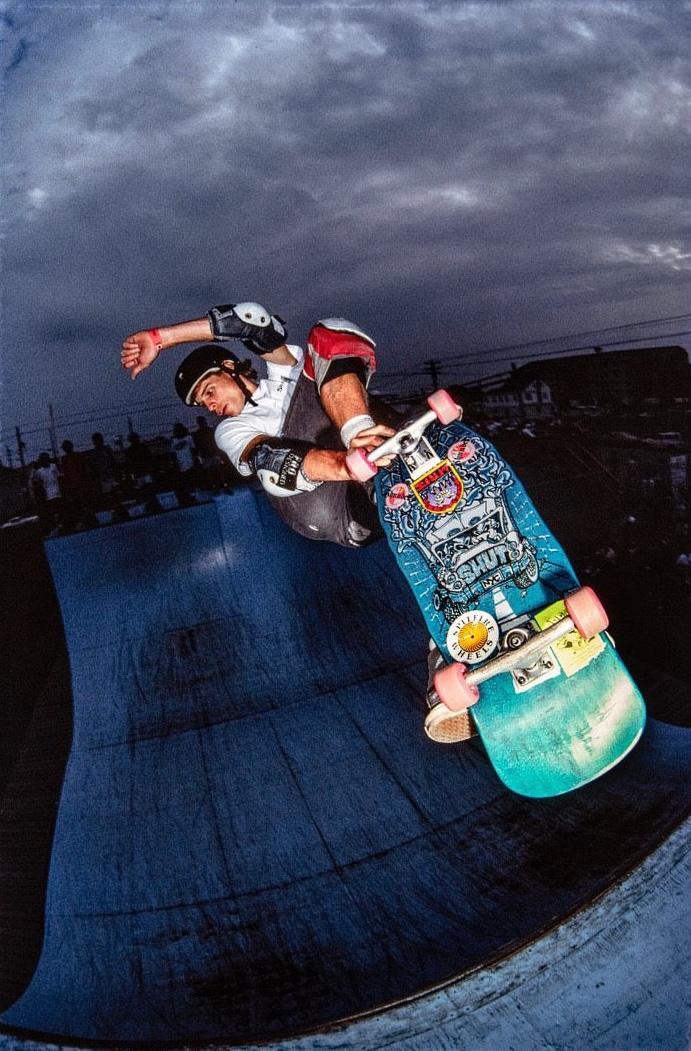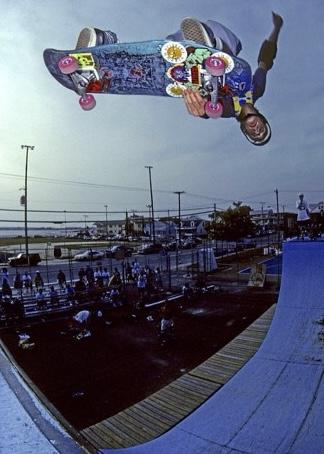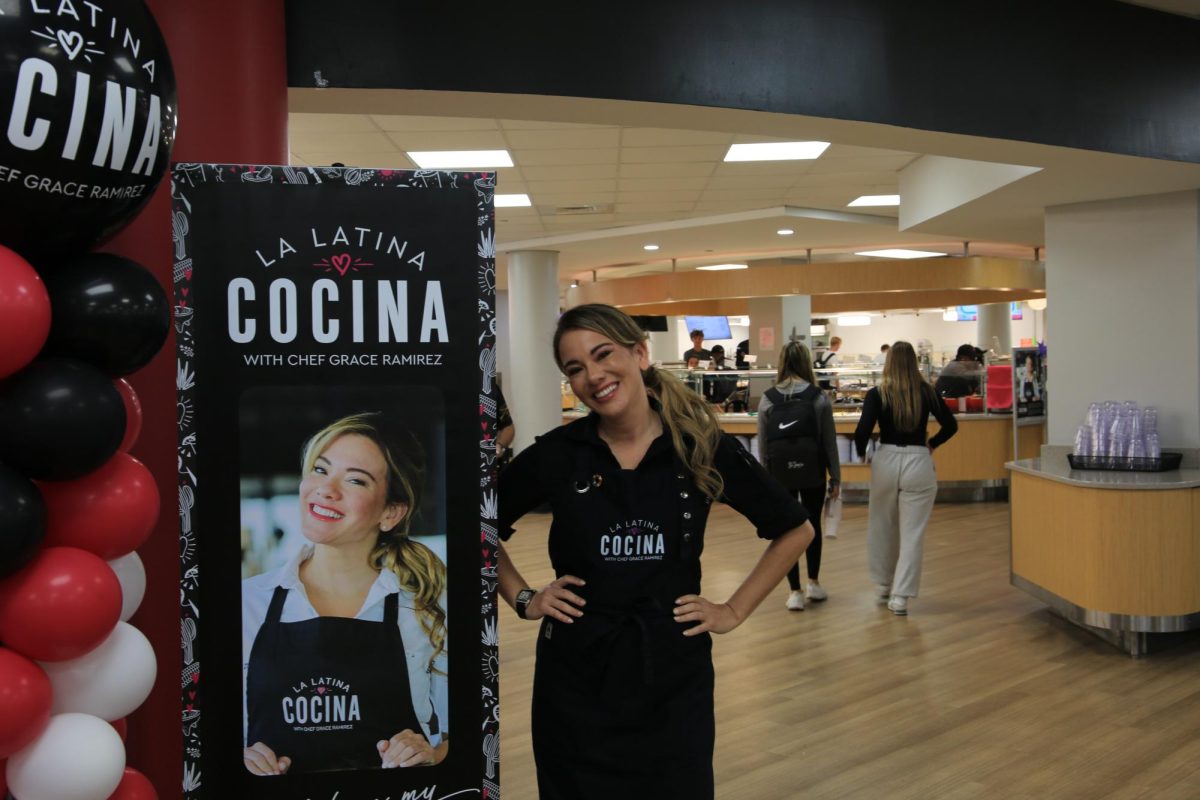Steve Moelter, Ph.D., is an associate professor of psychology and co-director of the Neuroscience Program. Born and raised in Doylestown, Pennsylvania, Moelter started skateboarding at age 12. From then through his time as an undergraduate at Penn State, Moelter excelled at skateboarding to the point of traveling to contests all along the East Coast with sponsors such as Spitfire Wheels, Thunder Trucks, Kryptonics Skateboards and SHUT Skateboards. The Hawk sat down with Moelter to learn more about his time as a skateboarder.
The Hawk: How did you first become interested in skateboarding?
Moelter: Like a lot of people, I had a group of friends who were interested in trying out a variety of things, and I also went to the Jersey Shore for most of my childhood. Eventually, that led, when I was about 12, to picking up a skateboard during one of those trips. It was the early ’80s at that point, and I brought a skateboard home to those same friends in my area. I think we all shifted pretty quickly from whatever we were doing at the time, which is probably riding BMX bikes or 12-speed bikes, to skateboarding all the time, from about age 12 or 13, up into our 20s, at that point. That’s really where it started.

PHOTO COURTESY OF GEOFF T. GRAHAM
The Hawk: Did you ever skate in contests?
Moelter: By the mid part of the ’80s, we had started reaching age 16 or so, getting our driver’s licenses, starting to move around and needing jobs. Most of my friends and I started to work at a local skate shop that was in Ambler. For that area, the Ambler Trophy and Skateboard Shop was a big popular spot that was selling skateboards and trophies. There was also a ramp in that area, and they gave me a job to work at Ambler. Then Ambler also developed a bit of a team. They would help to send us or sponsor us to go to street skating contests around Philly and the Mid-Atlantic areas. The name was Team Toxic.
The Hawk: Was the skate shop your only sponsor, or did you have any sponsorships directly from brands?
Moelter: Through the skate shop, we developed other sponsorships through brands like Kryptonics. Kryptonics was the first sponsor. We had a clothing sponsor, Life’s a Beach Clothing, which is still around. Freestyle sunglasses and companies like that that sponsored us through the skate shop. Eventually, we left the skate shop and many of the guys that we rode with developed independent sponsors over time. Eventually, I was sponsored by a skateboard company that made decks out in New York City called “SHUT Skate[board]s.” Also, “Thunder Trucks” and “Spitfire Wheels” were two other sponsors of mine, as I was skating a lot more by the late ’80s.
The Hawk: With all of these sponsorships from major companies, did you ever look at professional skateboarding as a career possibility?
Moelter: Some of the guys I skated with became pretty well-known professional vert skaters, and the guys that became pros I always knew were sort of one level above me. They were more likely to be winning the contest that we were traveling to. One friend of mine became the national vert halfpipe skateboarding national champion in 1994. I was skating with guys that were pro already and thought, “I don’t know if I’m quite there yet, but maybe that would be cool.” I don’t know if I had that dream exactly, that I wanted to be a professional skateboarder. Something about that didn’t feel right to me, because I don’t think I ever thought the goal was to go pro. I think my goal was more to be a skater and have fun.
The Hawk: Did you ever stop skating?
Moelter: I never stopped skateboarding, really. I would say I’m still a skateboarder because I could still skateboard. It just depends on time, if I have an opportunity to go somewhere and whether I want to risk being in pain for that. It’s sort of a personal connection — I think most skaters feel like you’re always a skateboarder, it kind of becomes part of you.
The Hawk: Learning a skateboard trick takes tons of trial and error, usually falling repeatedly before landing it. How do you look at this process of learning a trick as a psychologist?
Moelter: That’s the same way we learn in almost any sport or motor activity. That person playing a musical instrument, or playing basketball or soccer that’s trying to develop a new skill, the first time they do it, it’s really kind of rote, and very verbally described to themselves. They talk their way through the steps. It’s kind of an awkward and clunky way to learn, like, ‘I need to move my fingers this way, I need to move my feet in this way.’ It’s not very good for performing the task, but it’s the only way that you learn — by talking your way through the steps and then practicing those steps in sequence. Only after that practice does it become automatic or more procedural. So, even in my classes, I talked about the difference between verbally describing steps or techniques to yourself and then practicing it to the point where you don’t have to do that verbal description anymore. And then it becomes automatic and procedural.
The Hawk: How do you feel about your transition from skateboarder to professor?
Moelter: The skateboarders that I know may not be professors, but they’re in amazing careers in the military, or they have an art studio, or they’re picture framers, or they are artists or they make videos, and they’re well-known for those things. I think my path is just a different path, but it’s the same thing. It’s just making good decisions and being really willing to work hard. Skateboarder-turned-academic is really no different than skateboarder-turned-artist.

PHOTO COURTESY OF GEOFF T. GRAHAM

















































